General Discussion
Related: Editorials & Other Articles, Issue Forums, Alliance Forums, Region ForumsIf we can land on the Moon in 10 years can we do this?
Dikes where they can be built
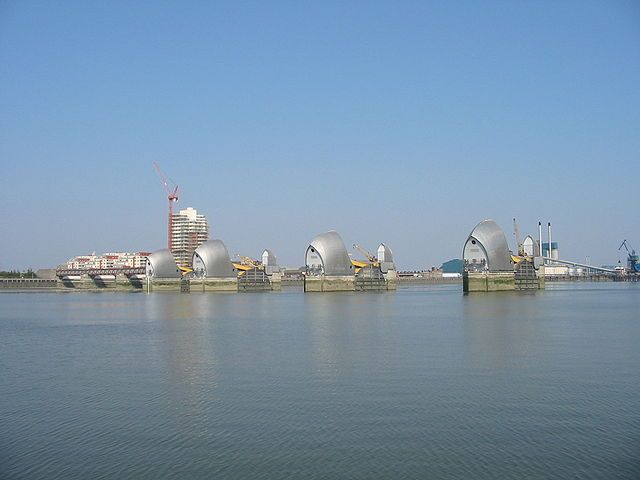
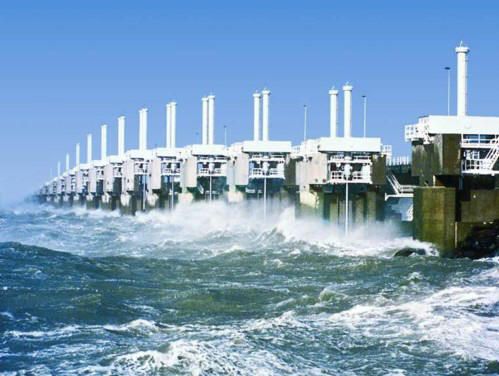
Ocean Turbines
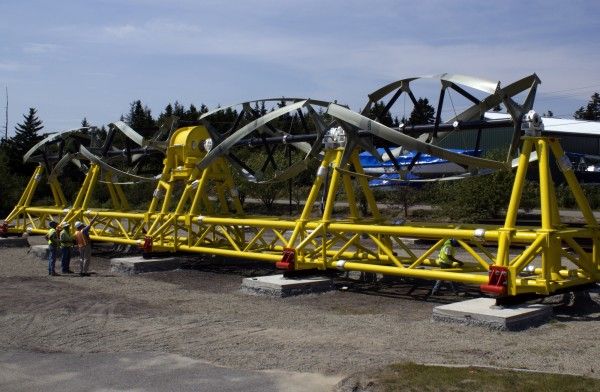
skyscraper farming
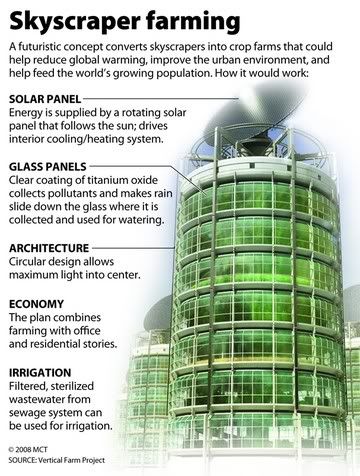
Urban farming and use of solar panel
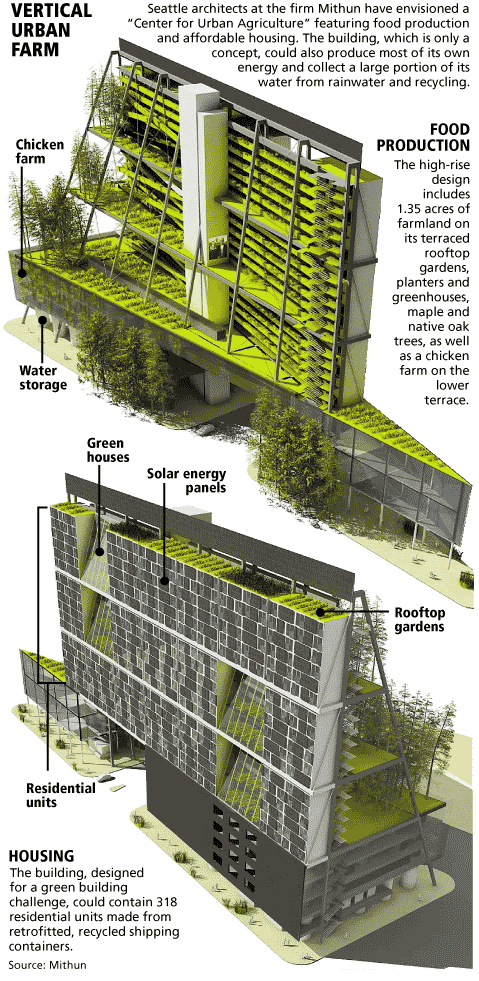
Auggie
(31,130 posts)lunatica
(53,410 posts)Auggie
(31,130 posts)To better days:
![]()
Sherman A1
(38,958 posts)We can do just about anything that we put our collective minds and energy to do. That said, won't happen as well stated in the post above noting the oil lobby.
Spider Jerusalem
(21,786 posts)The Apollo programme was not just about getting to the moon, it was about developing military technology for ICBMs and satellites, and about proving the USA had a bigger dick than the Soviets. I don't think that you can reasonably expect Congress to fund anything that doesn't have a nationalist/militaristic angle to make it attractive (especially not when much of Congress represents states with significant oil, natural gas and coal interests).
Tierra_y_Libertad
(50,414 posts)lunatica
(53,410 posts)If that's the way to do it then so be it.
randome
(34,845 posts)[hr][font color="blue"][center]Sometimes it seems like the only purpose in life is to keep your car from touching another's.[/center][/font][hr]
Spider Jerusalem
(21,786 posts)"You can always count on the Americans to do the right thing, after they've tried everything else."
onecaliberal
(32,775 posts)Sadly not as we continue to bow to oil and coal with their lobby and the bought and paid for polls that we continue to elect.
Jenoch
(7,720 posts)I lived n the most rural congressional district in the entire country. To me, thw skyscraper farming looks extremely expensive and quite ridiculous.
lunatica
(53,410 posts)I think it would solve a lot of problems that farming has. No dependency on the daily weather forecast. The effects of blight, disease, droughts, cold snaps would be controlled from within the buildings.
And lastly, much of the land could go back to it's natural wild state.
They could be used in third world countries that have limited farming land to grow their own food. They could be built in huge cities that could become self sufficient (picture one of these every dozen square blocks or so, vying for their part of the citiscape and the skyline) and they could grow food all year around, even in winter.
What's ridiculous about that?
Jenoch
(7,720 posts)It's a fantasy.
kentauros
(29,414 posts)Article by: JEFF STRICKLER , Star Tribune Updated: April 8, 2014 - 3:24 PM
By taking organic farming indoors, a St. Paul company can supply vegetables – and fish – year-round.
The land of sky blue waters has become the land of bright green vegetables.
The former Hamm’s brewery in St. Paul, built over artesian wells that led to the company’s iconic motto, has been repurposed as an aquaponic facility that uses the water to grow fish and vegetables. As harvesting ramps up, it’s only the second aquaponic operation in the country to be certified as 100 percent organic.
“This is a new way of farming,” said Dave Haider, one of the founders of Urban Organics. “I’ve become extremely passionate about this — you could even say borderline obsessed.”
The company’s goal is to have its produce in supermarkets, co-ops and restaurants the same day it’s harvested. And because the growing is done inside, the process will continue year-round.
(much more at link)
Derek Markham (@derekmarkham)
Technology / Clean Technology
July 10, 2014
This indoor Japanese farm uses LED lights and hydroponics to produce lettuce 2.5 times faster, with just 1% of the water, when compared to an outdoor farm.
When we think about factories, and what we decry as "factory farms," we probably don't think very highly of them as being a key component in the future of agriculture, but if we can take what factories do best, such as use technology to build efficient production lines, and pair that with what nature does best, which is growing biomass from light and water and minerals, then growing food in plant factories starts to make a lot of sense.
Converting what were formerly industrial buildings into indoor farming operations, especially in urban areas and locations that aren't conducive to year-round outdoor food production, could be an excellent reuse of existing resources (the buildings themselves, the infrastructure that supports them, and their locations in or near cities) to help build a more sustainable food system. And this sort of operation can be done in a way that's both highly efficient and productive (PDF), in essence turning our ideas about industrial-scale factory farming on their heads.
In Miyagi Prefecture, in eastern Japan, plant physiologist Shigeharu Shimamura is showing how it can be done inside a former Sony Corporation semiconductor factory, using special LED fixtures and hydroponics to grow massive amounts of food in an incredibly space- and water-efficient manner.
This plant factory is now the world's largest indoor farm lit by LEDs, and the 25,000 square feet operation is producing 10,000 heads of lettuce per day. Per day. Every day.
(more at link)
I see the second one above is using pink/violet-light LEDs, considered the most effective part of the spectrum for growing plants indoors.
Jenoch
(7,720 posts)The Hamm's plant has sat empty on West 7th for years. It was no longer viable as a brewery. Many plans were made an abandoned. This is much different that building a skyscraper in midtown Manhattan and growing vegetables.
kentauros
(29,414 posts)"Skyscraper farming"
"Urban farming and use of solar panel"
So, even though you want to piss on the idea by focusing strictly on the images given, your argument that it's all just a fantasy has been irrevocably debunked! So there ![]()
Jenoch
(7,720 posts)Sure, some people have taken over abandoned buildings and are growing mushrooms. There is somebody growing hydroponic vegetables in the abandoned Hamm's Brewery. Let me know when they make a profit and if they're around in three years.
Let me know when hydroponic vegetables are growing in a SKYSCRAPER of 20 stories or more in NYC.
kentauros
(29,414 posts)so I won't bother telling a pessimist that it exists ![]()
I'm happy something's being done now, and have no doubts that these ventures will indeed still be around in three years. I tend to think in terms of doing ideas versus tearing them down down because it's hard.
Jenoch
(7,720 posts)rather than in a skyscraper in Midtown Manhattan. It would also be ridiculous to have a major international bank headquartered and staffed in a farmhouse in Nebraska.
jwirr
(39,215 posts)we finally realize that we have to do it.
kentauros
(29,414 posts)is dig up the landfills for the resources buried there. Ferment them first, by pumping oxygen and water vapor down, then dig up the remains, grind, and sort.
jwirr
(39,215 posts)That was back in the early 50s when they were used differently than now. Dad would look for bike parts so he could fix the neighborhood kid's bikes. He was know all over the area. We also found things like canning jars, nice dishes, jewelry and lots of other things.
kentauros
(29,414 posts)though not where we lived. Just seeing them on weekly trips to my grandparents' place out in the country ![]()
And I always cringe here when I hear people tossing easily-recycled glass bottles into the dumpster. Despite all the neighborhood recycling bins out on people's lots, apartment dwellers seem to almost always be anti-reason. I know I'm the only one here that takes my stuff to the recycling center. I've even paid to have an old bed and armchair recycled by a company that does so sustainably. Everyone else just puts their similar furniture items in or next to the dumpster. No extra effort taken whatsoever.
steve2470
(37,457 posts)because of the kind of rock that underlays Miami (porous limestone). Otherwise, a good idea.
kentauros
(29,414 posts)is restore the mangrove forests, and possibly the barrier sandbars. The mangroves alone will help with flooding from storms, but none of that will stop rising seas. Maybe if they start planting lots of cypress trees, they can turn all of their cities into treehouse dwellings ![]()
Uncle Joe
(58,272 posts)Thanks for the thread, lunatica.
lunatica
(53,410 posts)I think it's a great idea, but evidently most people's first reaction is to deny all possibility of this type of innovation. They do their best to shoot it down without even considering the potentials.
Uncle Joe
(58,272 posts)Last edited Sun Jul 20, 2014, 09:42 PM - Edit history (1)
the forest is much greater in scope. ![]()
gejohnston
(17,502 posts)you will have to find people who will want to live there and pay for it.
lunatica
(53,410 posts)I would gladly work in one of those building if they paid me. Thousands of people would. And it can eventually pay for itself. AS for the money involved. The Federal government, State government and City governments could provide tax revenues to build them as well as private funds. Farming is already being largely subsidized by tax money.
gejohnston
(17,502 posts)lunatica
(53,410 posts)lastlib
(23,140 posts)*GOP - Defenders of the 1% and the status quo.
unblock
(52,113 posts)back then, republicans went along because it was tied in to the whole cold war thing.
nowadays they'd block it at every turn.
then our products would fail to perform safely and the whole thing would get shelved.
NickB79
(19,224 posts)The Apollo program was small, small potatoes in scale compared to what we're facing today in terms of adapting to climate change.
You're talking about dikes for HUNDREDS of coastal cities at risk of flooding.
Tens of THOUSANDS of wind turbines (if not hundreds of thousands if you really want to stop CO2 emissions, not just slow them down).
Tens of THOUSANDS of vertical farms, and ones far larger than the ones you used as examples (I note one of your graphics states in only provides 1.35 acres per building. That's enough to feed a dozen people, at most, IF intensively farmed).
Comparing the fight to prepare for the disasterous effects of climate change to the Apollo mission is so far off the mark, it's not even funny.
The only thing that even comes close to the scale of what we realistically need to do is the war effort of the 1940's. Factories were converted to military equipment production, so that very few consumer goods were even on store shelves (no new cars, hunting rifles or ammo, sewing machines, farm equipment, etc). Rationing was instituted. Metal scavenging and Victory gardens for the war effort were in full swing. Young people were drafted into service.
Now take that 5-year effort, and stretch in out to 50 years. And at the same time cope with declining food supplies from conventional sources (crop losses, sea life collapsing, etc), angry refugees fleeing areas hit by climate disasters, and a collapsing global economy. THEN you'd be close to the mark of what we're facing.
kentauros
(29,414 posts)other than my support for urban farming (see sub-thread above) is to tap the wind-power potential from deep offshore platforms.
I seem to only find conflicting reports on the full, untapped potential of wind over the oceans, but have seen it range from about 20 TWh up to 90 TWh (terawatt-hours.) Worldwide usage is over 100 TWh, so we'd have to pair it with solar, and all the other forms, too.
However, I'd like to see more money put into Polywell Fusion. It's the one form of fusion that isn't just an expensive way to boil water for steam-powered electricity generation (Polywell Fusion collects and converts energy directly from the fusion reaction.)
Thanks for the thread! I love being optimistic about our possible options ![]()
lunatica
(53,410 posts)I love being optimistic also. This world would be a far sadder place if the naysayers were running everything. It's so discouraging to have people's first response be, "It'll never happen because... (insert whatever reason here). It's dismissed in one sentence without the slightest discussion.
kentauros
(29,414 posts)It's one reason I don't post to DU nearly as much as I used to.
If you don't look at it already, I highly recommend TreeHugger. I do sometimes get tired of some prefab designs they report as they're too often the kind of shelter only people making dual 6-figure incomes could afford. I think they finally got the message from their readers on that topic and so report on more of the affordable designs and ideas. And, they do link to that many more sites worth researching ![]()